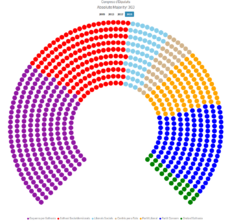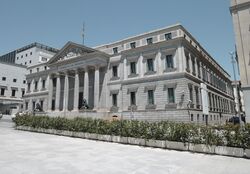Parliament of Eothasia
Courts of the Empire Corts d'la Impèri | |
|---|---|
| (LXXXIX Corts) | |
 | |
| Type | |
| Type | |
| Houses | Congress of Deputies Imperial Senate |
| Leadership | |
Supreme Chancellor of the Empire | Priscilla Poriér since Election: January 1st, 2004 |
Junior Chancellor of the Empire | Chellick Coltys since Election: April 1st, 2007 |
Chancellor of the Empire | Valerius Eäron since Election: January 1st, 2011 |
Speaker of the Imperial Senate | Senator Isidoro Villa since May 5th, 2017 |
Speaker of the Congress of Deputies | Deputy Miguela Romà since May 5th, 2017 |
| Structure | |
| Seats | 800 75 Senators 725 Deputies |
| File:Senate of the Republic Eothasia.png | |
Imperial Senate political groups | Esquerra per Eothasia (22) Eothasi Socialdemòcrats (16) Liberals Socials (5) Centris per a Tots (7) Partit Liberal (10) Partit Conserv (13) Dreta d'Eothasia (2) |
 | |
Congress of Deputies political groups | Esquerra per Eothasia (223) Eothasi Socialdemòcrats (161) Liberals Socials (57) Centris per a Tots (39) Partit Liberal (85) Partit Conserv (136) Dreta d'Eothasia (24) |
| Elections | |
Imperial Senate last election | May 4, 2017 |
Congress of Deputies last election | May 4, 2017 |
| Meeting place | |
 | |
| Capitolium, Elidani, Eothasia | |
The Courts of the Empire [Eothasi: Corts d’la Impèri] are the legislative branch of the Unét Eothasi Nórië. It is a bicameral organism, composed of the upper house — the Imperial Senate — and the lower house — the Congress of Deputies.
The Imperial Senate is composed of 75 senators, with each of the thirty-seven districts that compose the seven repúblics of the Empire having two representatives each, plus an additional representative for Elidani.
Meanwhile, the Congress of Deputies is a system based on population-related representation; as such, the repúblics with higher populations have more representation in the Congress of Deputies than areas with lower population. The Congress of Deputies is composed of 725 members in total.
Members of the Courts of the Empire are voted directly by the citizens of the country. These elections occur once every four years and the entirety of both houses are voted for. In order to become a representative of either house of the Courts of the Empire, it is necessary for an individual to be of Eothasi birth and to have obtained, at minimum, the Vexian Citizenship Tier.
History
Following the collapse of the Eothasi Confederation at the end of the Civil War, it was decided that the kingdoms — now, in almost all aspects, one — should formally and officially unite their governments to form just the one. This government would be a democratic and meritocratic organization that would only permit those with valuable work ethics and meritable achievements to ascend the ranks.
As such, the government was established with a clear separation of powers between executive, legislative, and judiciary powers officially in 1681. The Courts of the Empire took on the mantle of the legislative branch of government. Since then, there have been 89 different compositions of the Courts, including the presently active.
In the late 17th Century, after the official selection of Elidani as the capital of the newly formed Grand Eothasi Empire, the construction of the Capitolium — the building where, to this day, the Courts of the Empire convene for sessions — began. It was completed by 1701 and the first session was held in May 10, 1701 by the 6th Courts of the Empire.
Privileges and Pay
Privileges
Members of the Courts of the Empire have a series of privileges due to their position within the Eothasi government. These include freedom from arrest except in cases of treason, felony, and disturbance of the peace
Pay
The gross salary of all members of the Courts of the Empire — for both Congress and Senate — is 53.956,18ℭ. This does not include commissions (such as those for Congress or Senate Speaker, each of which receives an amount close to 30.000,00ℭ). There are also a series of indemnizations for distance (the Members of the Court that are from regions farthest away from Elidani receive more than those closer to the capital).